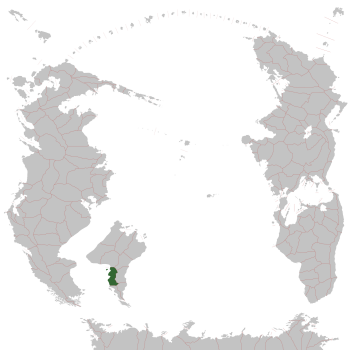Esfalsa (Pacifica)
Esfalsa | |
|---|---|
Motto: Portus pro omnibus A haven for all | |
 | |
| Capital and largest city | Ricubai |
| Official languages | Austral |
| Ethnic groups (2020) |
|
| Religion (2020) |
|
| Demonym(s) | Esfalsan |
| Government | Unitary presidential directorial republic |
| Levi Herdes | |
| Legislature | Assembly |
| Formation | |
• Confederation | 1043 |
• Republic established | 1858 |
• Current constitution | 1924 |
| Area | |
• Total land area | 65,987 km2 (25,478 sq mi) |
| Population | |
• 2020 estimate | 18,793,005 |
• 2015 census | 18,679,062 |
• Density | 284.80/km2 (737.6/sq mi) |
| GDP (PPP) | 2020 estimate |
• Total | $1.18 trillion |
• Per capita | $62,617 |
| GDP (nominal) | 2020 estimate |
• Total | $1.21 trillion |
• Per capita | $64,289 |
| Gini (2019) | 27.4 low |
| HDI (2019) | 0.932 very high |
| Currency | Esfalsan fallor (₣) (EFF) |
| Time zone | UTC-1 (CET) |
| Date format | mm/dd/yyyy CE |
| Driving side | right |
| Calling code | +33 |
| Internet TLD | .ef |
Esfalsa is a sovereign state located on the continent of Crabry in the South Pacific. It covers an area of 65,987 square kilometres (25,478 sq mi), with a population of nearly 19 million. It borders New Crawford to the north, Phanama to the northeast, and Alterra to the east, along with a maritime border with the Uaiekmıst territory of Techganet in the Transcrabrian Sea. Its capital and largest city is Ricubai, facing Portum Bay, and other major urban areas include Italedo, Loque, and Ogden.
Historians generally trace the emergence of an Esfalsan ethnic identity to around the 5th century BCE. Esfalsa itself was initially formed as a confederation of seven different kingdoms in 1043, reflecting increasingly close ties as a result of shared ethnic, cultural, and marital ties. The present Constitution of Esfalsa was adopted in 1858, establishing a single, unitary republic, which remains in place today despite significant amendments and revisions. Among the most notable of these amendments is the Second Italedo Amendment of 1924, which installed a number of sweeping changes, including the establishment of the Chancellor of Esfalsa as the head of government.
Esfalsa is a highly developed country, with a high-income economy powered by its status as a leader in several financial, agricultural, and technological sectors. Esfalsa ranks highly on the Human Development Index, with extensive government programs in education, health care, and other social services. It is a member of the World Forum, CPSC, and IUFA.
History
Geography
Politics
Esfalsan government is a unitary, presidential directorial republic. Legislative power is vested in the unicameral Assembly of Esfalsa. The Chancellor serves as the head of government, while the President of the State Council, a title that rotates annually among the seven-member council in order of seniority, serves as the head of state.